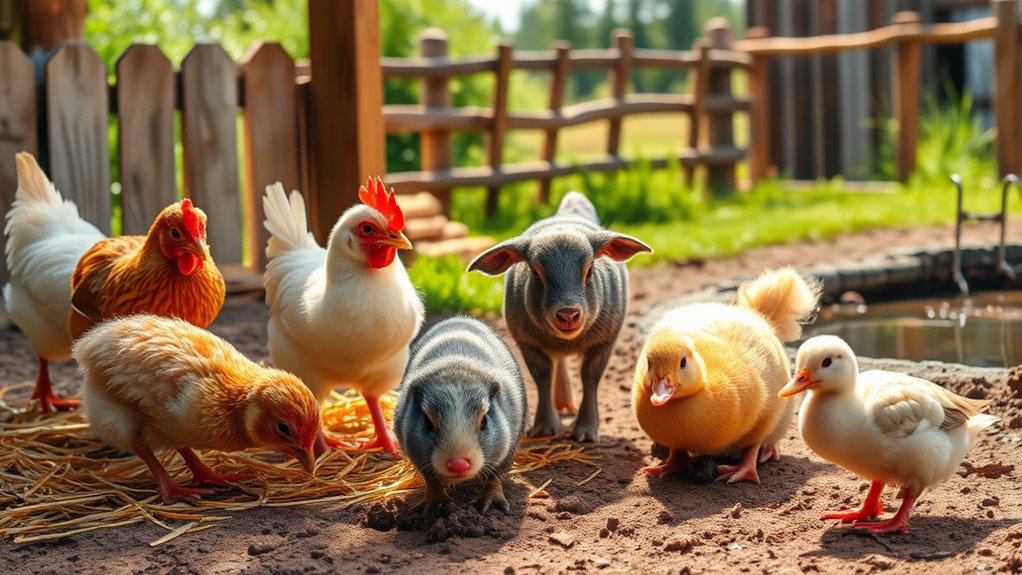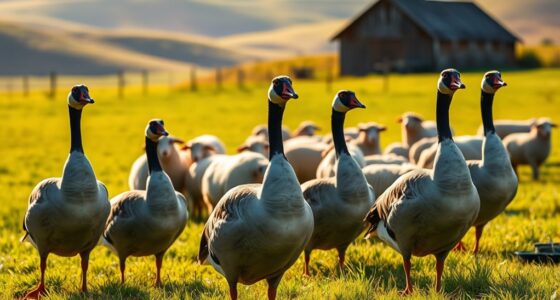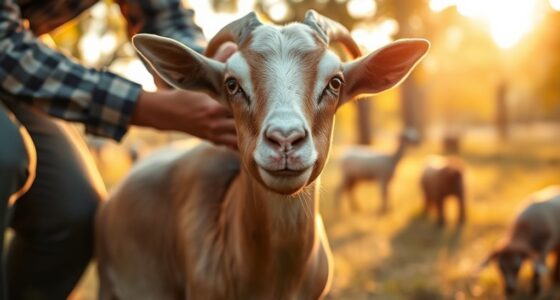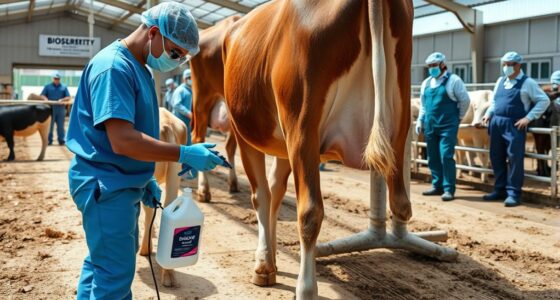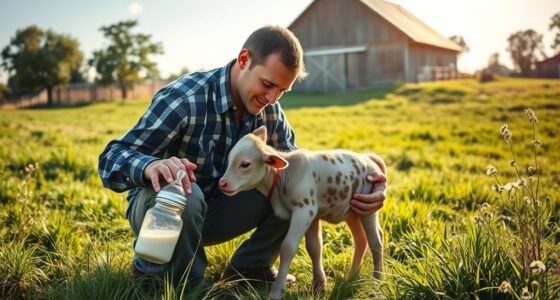If you’re starting a homestead, consider chickens, ducks, goats, sheep, and rabbits, as they’re all easy to care for and provide food or pest control. Chickens and ducks are hardy, require minimal space, and give fresh eggs, while goats and sheep offer milk, meat, or wool with simple needs. Rabbits are low-maintenance and can help control weeds. If you’d like more tips on choosing the best animals, keep exploring these options further.
Key Takeaways
- Chickens are resilient, low-maintenance, and require minimal space, making them ideal for beginners.
- Ducks are hardy, easy to care for, and help with pest control, needing less frequent cleaning.
- Goats are adaptable, require simple fencing, and provide milk, meat, or fiber with minimal care.
- Sheep are low-maintenance, suitable for grazing, and offer wool, meat, or milk, ideal for novice farmers.
- Starting with hardy animals that need basic shelter, proper nutrition, and outdoor access simplifies homestead livestock management.
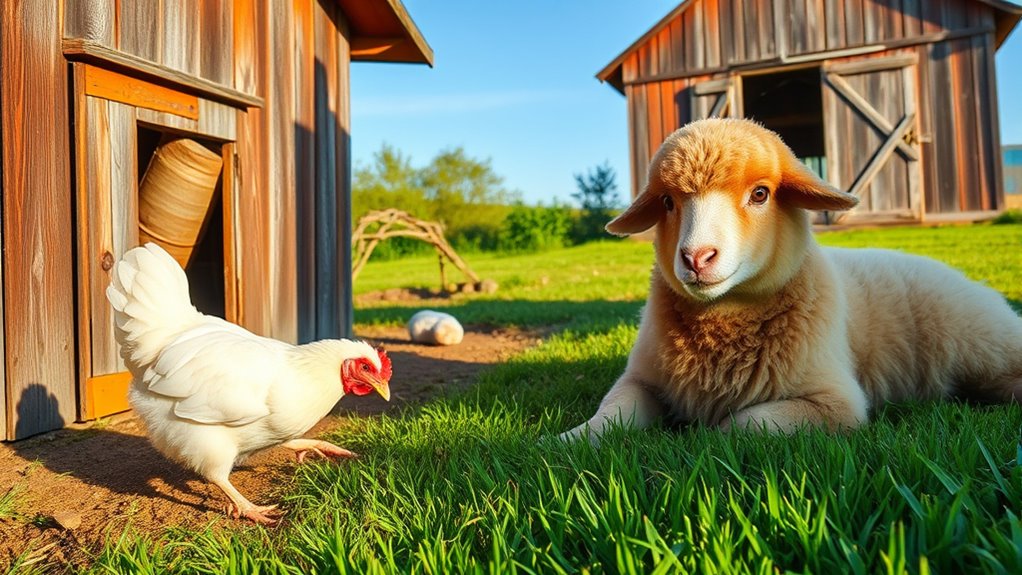
Starting a homestead often means choosing the right farm animals to suit your needs and environment. When you’re just beginning, it’s smart to focus on animals that are easy to care for and require minimal experience. Poultry, in particular, makes an excellent choice because they’re hardy, productive, and relatively low-maintenance. Chickens, for example, provide fresh eggs, help control pests, and don’t need a lot of space. They thrive in small coops, which are easy to build and keep clean. Proper poultry care involves providing clean water, balanced feed, and a safe shelter. You’ll want to ensure they have enough space to roam and access to outdoor areas for foraging, which helps with livestock nutrition naturally. Chickens are also resilient and forgiving, making them ideal for beginners.
Starting a homestead? Focus on hardy, low-maintenance animals like chickens and ducks for easy beginner care.
Ducks are another popular poultry option. They’re hardy, require less frequent cleaning than chickens, and can help with pest control in ponds or wet areas. Ducks also lay eggs, though their care needs are slightly different. They prefer a water source to swim in, which means you’ll need to provide a small pond or kiddie pool. Their poultry care needs include a balanced diet rich in grains and greens, along with access to clean water. Ducks can be less aggressive than some chickens, making them easier to handle.
Aside from poultry, small livestock like goats and sheep are also beginner-friendly. Goats are hardy, require minimal space, and can provide milk, meat, or fiber. They need a sturdy fence to keep them safe and a shelter that protects from wind and rain. Their livestock nutrition is straightforward if you provide hay, grains, and browse in the form of shrubs and weeds. Goats are curious and intelligent, so they thrive with some daily interaction and enrichment.
Sheep are similarly easy to care for and are great for wool, meat, or milk. They need a pasture or grazing area, basic fencing, and a shelter to shield them from harsh weather. Their livestock nutrition is simple—mainly grass and hay—but they also benefit from mineral supplements. Both sheep and goats are resilient animals that adapt well to various environments, making them excellent choices for new homesteaders.
In essence, choosing animals like chickens, ducks, goats, or sheep can set you on the right path. They’re manageable, provide valuable products, and teach you the basics of livestock care and livestock nutrition. Starting with these animals allows you to learn essential skills while enjoying the rewards of your homestead. As you gain experience, you can expand your farm with more animals or specialized breeds, but for now, these options keep things simple and sustainable. Additionally, selecting animals with easy livestock nutrition requirements can help ensure your success and reduce the risk of common mistakes.
Frequently Asked Questions
What Are the Initial Costs for Starting With These Animals?
When considering the initial investment for farm animals, your setup expenses vary based on the type and number of animals. For small poultry like chickens, expect to spend around $100 to $300 on coops, feed, and supplies. For goats or rabbits, plan for roughly $200 to $500 for pens, initial health care, and feed. Budgeting carefully guarantees your startup costs are manageable and sets a solid foundation for your homestead journey.
How Much Space Do They Require per Animal?
Did you know that chickens need about 2-3 square feet of animal housing per bird? For space efficiency, you should plan for at least 10 square feet of outdoor run space per chicken. Ducks, on the other hand, require more room—around 4-6 square feet of animal housing and a pond or water source. Proper space management makes certain healthy animals and easier care on your homestead.
Are These Animals Suitable for Beginners With No Experience?
Yes, these animals are ideal for beginners with no experience. Many beginner friendly breeds require minimal care and are forgiving if you make mistakes. They thrive with easy care routines, making them perfect for new homesteaders. You’ll find that these animals adapt well to your environment, are generally hardy, and don’t demand complex management. Starting with them boosts your confidence and helps you learn the basics of animal husbandry.
What Are Common Health Issues to Watch For?
Imagine your farm as a fortress, standing strong against health threats. You should watch for common issues like respiratory problems in poultry, parasites in livestock, and nutritional deficiencies. Disease prevention is key, so regularly vaccinate and isolate new animals. Parasite control keeps pests at bay, avoiding infestations that weaken your animals. Staying vigilant and maintaining good hygiene helps guarantee your animals stay healthy, making your homestead a thriving, resilient sanctuary.
How Much Daily Care and Maintenance Do They Need?
You’ll need to dedicate time daily for feeding routines and shelter maintenance. Most farm animals require consistent feeding, fresh water, and clean shelters to stay healthy. For instance, chickens need daily feed and water checks, while goats require shelter protection from weather. Regular cleaning and inspection prevent health issues. By staying attentive to their needs, you make sure they’re comfortable, healthy, and productive, making your homestead more successful and enjoyable.
Conclusion
Starting your homestead with these easy farm animals makes the journey both fun and manageable. With a little effort, you’ll soon be enjoying fresh eggs, milk, and even some friendly companionship. Think of it as your own little “Wild West” adventure, but with less dust and more joy. So go ahead, pick your favorites, and watch your homestead thrive—yep, it’s as simple as a Sunday picnic in Central Park!

